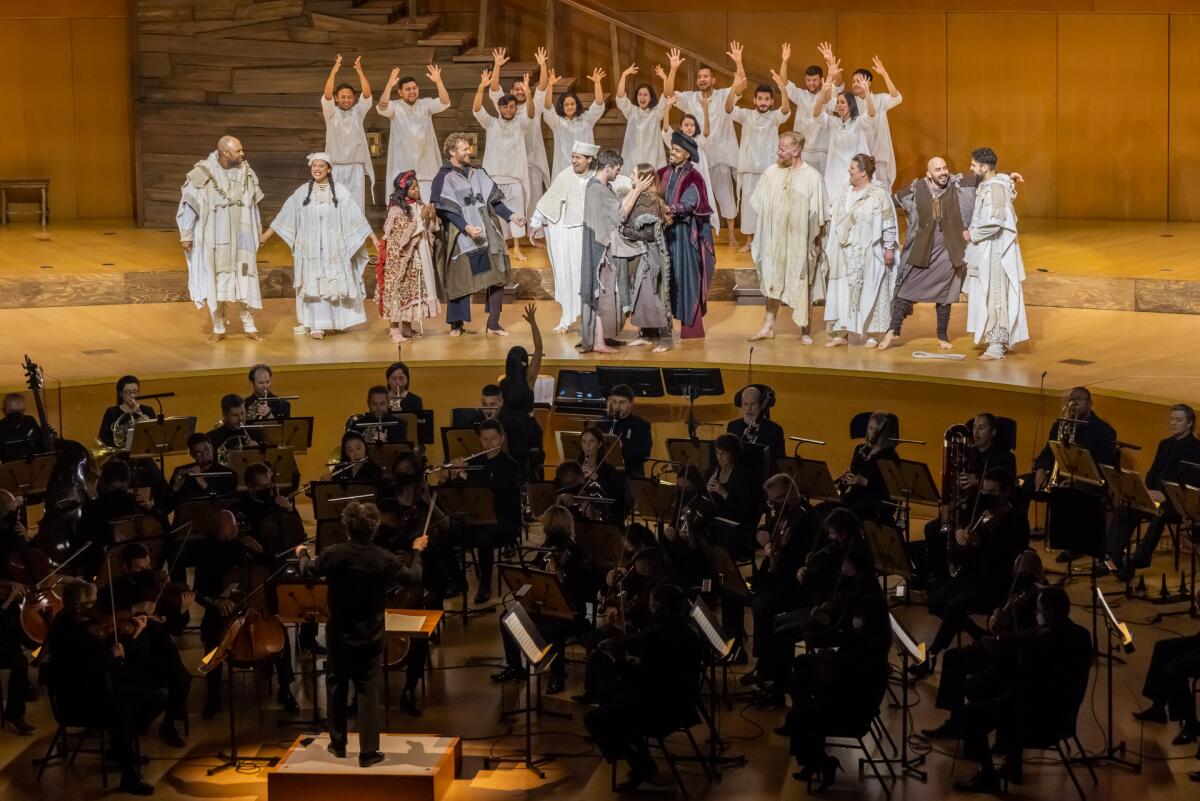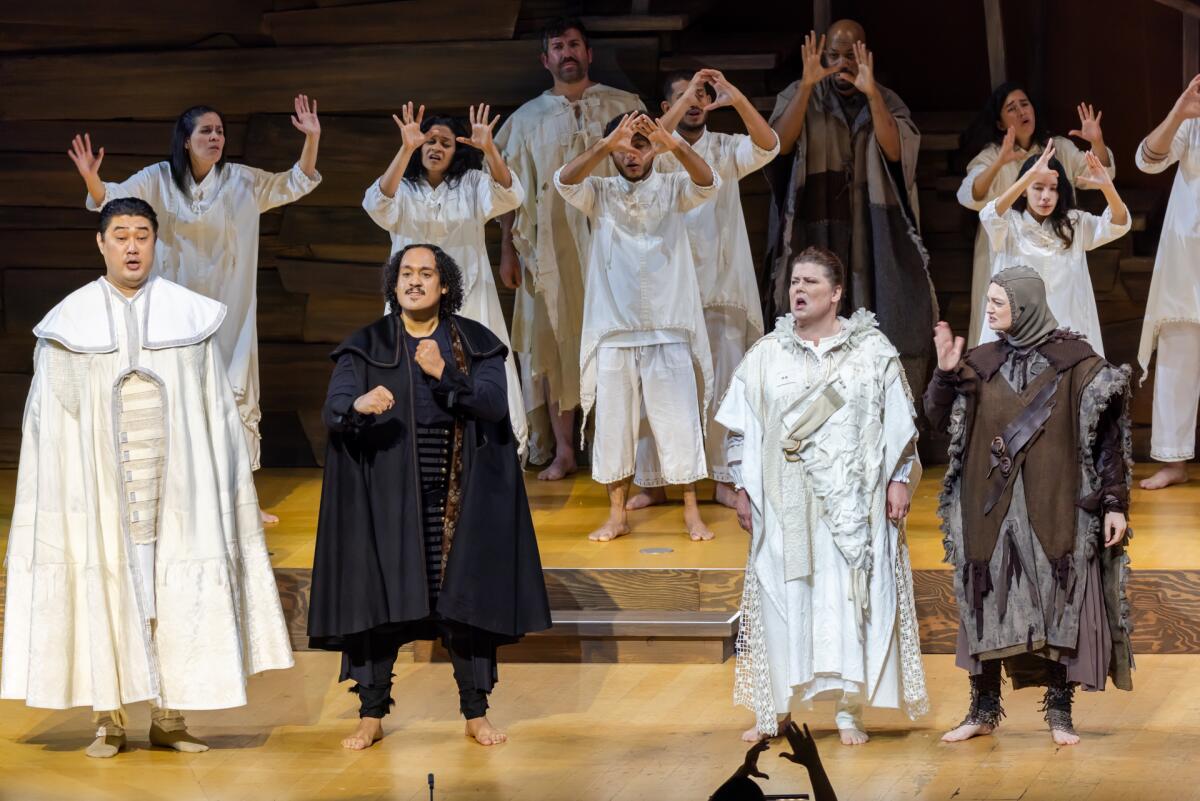Review: Gustavo Dudamel and Deaf West Theatre vividly reimagine Beethoven’s ‘Fidelio’ opera

Beethoven’s “Fidelio” is a brave opera of liberation. It may also be a dramatically flawed opera, and one Beethoven anguished over longer than any of his other great works. But liberation itself is a flawed, fluid process that, as current events love to remind us, we’ve never managed to get right.
The inimitable value of a flawed “Fidelio” is that it allows no end of interpretations. It has become a politically provocative opera that attaches itself to the human spirit in ways that shock as well as inspire. Just last month, for instance, a production by Heartbeat Opera movingly remade “Fidelio” to reflect contemporary American prison life in the era of Black Lives Matter.
Now, though, we have something altogether new and radical in the annals of opera. In an extraordinary production last week at Walt Disney Concert Hall, Gustavo Dudamel and the Los Angeles Philharmonic, with Deaf West Theatre, liberated not only “Fidelio” but also transformed the act of listening. Liberation on the lyric stage has never looked like this.
To describe the project might make it seem impossibly overstuffed. Each role is divided in two, between an actor from the notable L.A. company Deaf West, who signs their part, and a singer. For the chorus, singers remain seated on two sides of the stage, while members of White Hands Choir — the young, hearing-impaired Venezuelan ensemble that is part of the country’s El Sistema — parade majestically on stage while carrying candles.
There are video screens with signers to cue the actors. The sign language had to be translated from the original German. English titles are projected above for the audience. The action takes place on a platform behind the orchestra. The actors wear rugged costumes in dark earth tones or black; the singers are draped in more classical ones in white; the White Hands members are in white robes (but without their trademark white gloves). Solange Mendoza’s effective costumes and James F. Ingalls’ superb lighting help keep everything on stage straight.
For the record:
6:07 p.m. April 18, 2022An earlier version of this article stated that the production employed as many as five different sign languages. Only two sign languages were used in the production.
Among many irons in the “Fidelio” fire are the Venezuelan film director Alberto Arvelo (director), Deaf West’s DJ Kurs (producer) and Gabriela Camejo (artistic director). Musicians and singers communicated by signing and lip reading with actors. With no direct travel between the U.S. and Venezuela, the White Hands had to come through, and quarantine in, Bogotá, Colombia.
The audience, too, brings its own different needs. About a quarter in Disney on Thursday night appeared to be deaf, animatedly waving their hands to applause at the end. All of this had been created for only three performances. Yet it became an outright breakthrough for opera.
Usually, the first thing said about the performance would be about the sheer exhilaration that Dudamel, the orchestra and a mostly first-rate cast brought to Beethoven’s score. “Fidelio” has often been treated as a conductor’s opera, and it only took Dudamel those first attention-getting four bars of the Overture, so like the famous opening of Beethoven’s Fifth Symphony, to convey a sense of purpose.
Still, it wasn’t until the comic opening duet that the real news reached us that this “Fidelio” would be far different than any other. I can’t read sign language, but I can read body language, facial language, movement language and surtitles. The deaf actors were all over the drama. Whether specifically understood by hearing audience members or not, they conveyed character and theater in ways that singers couldn’t possibly.

A problem with the opera has always been that Beethoven relied on dialogue between musical numbers rather than recitative. In musical comedy that’s one thing, but “Fidelio” doesn’t stay funny for long, and the spoken parts, often somewhat trimmed, are rarely less than awkward.
In this production they’re not spoken but signed in silence. Theatrically that means the dialogue is full of life and the silences are pregnant, making the arrival of each musical number ideally dramatic. Funny in this “Fidelio” means, moreover, full of laughs, and serious means wrenching, visceral emotion. Especially touching, too, is that while the singers may not attempt full-out acting, they do interact with their doppelgängers. The effect is that of seeing and hearing more than one side of each character.
In nearly every case, the pairing of singer with an actor, often looking very different, proved convincing. The warm if steely heroism of soprano Christiane Libor’s full-voiced Leonore developed additional radiance with astutely vulnerable Amelia Hensley as her alter ego. The bright-sounding Gabriella Reyes had a vibrant Indi Robinson at her side who helped push away the besotted Jaquino, portrayed by the equally lively tenor José Simerilla-Romero and actor Gregor Lopes.
Ryan Speedo Green’s powerful Rocco, the jailor, was matched by the clever Russell Harvard, whereas the equally powerful bass-baritone Shenyang’s nasty Don Pizzaro was vivaciously mimicked by the scene-stealing, silent-movie-esque and villainous Gabriel Silva. Tenor Ian Koziara, who sounded like he was struggling with a cold or something, was lucky to have the emotionally fervent Joshua Castille as a helpmate on stage.
The White Glove chorus, as the miserably incarcerated and then thrillingly liberated prisoners, moved to music with near precision. The members may not have been able to hear the magnificent Los Angeles Master Chorale, but they gave the heartwarming impression that they understood the message, which surely had hope-giving significance for these young Venezuelans.
As an opera of liberation, a hope-giver from a different era, “Fidelio” easily falls victim to modern-day pessimism. But unlike the bleak realism of many contemporary “Fidelio” productions, this resilient one — with the buoyant help of a Venezuelan conductor, director and chorus, along with an L.A. deaf theater company — prefers triumph to tears.
More to Read
The biggest entertainment stories
Get our big stories about Hollywood, film, television, music, arts, culture and more right in your inbox as soon as they publish.
You may occasionally receive promotional content from the Los Angeles Times.











